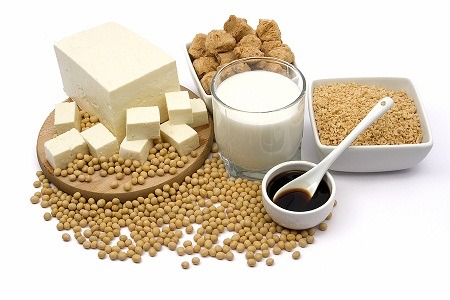Your Favorite Protein-Rich Foods Which Are Actually Unhealthy
Note: Friends, if you want to read this article in any other language, please change the language from the translate button at the top of this article.
Friends, here are 9 Protein-rich foods that may be your favorite and are assumed to be healthy but are actually unhealthy.
While protein is an essential nutrient that our bodies need, some protein-rich foods may not be healthy if consumed in excess or in certain forms.
9 Protein-rich Foods Assumed to be Healthy but Are Actually Unhealthy
1. Processed meat:
 |
| Processed meats are not considered healthy |
Processed meats are not considered healthy because they are often high in sodium, saturated fat, and preservatives.
Here are some reasons why:
1. High in sodium:
Processed meats are often high in sodium, which can increase blood pressure and increase the risk of heart disease, stroke, and kidney disease.
The high sodium content in processed meats is due to the addition of salt and other sodium-containing compounds used as preservatives.
2. High in saturated fat:
Processed meats are also high in saturated fat, which can increase levels of LDL or "bad" cholesterol in the blood.
Eating too much-saturated fat can increase the risk of heart disease, stroke, and other health problems.
3. Preservatives:
Processed meats are often treated with preservatives such as nitrates and nitrites to extend their shelf life and prevent bacterial growth.
These chemicals have been linked to an increased risk of cancer and other health problems.
4. Other additives:
Processed meats may also contain other additives, such as monosodium glutamate (MSG), which can cause headaches and other adverse effects in some people.
Studies have shown that regular consumption of processed meats is linked to an increased risk of chronic diseases like heart disease, cancer, and diabetes.
What to do? It's important to limit your intake of processed meats and choose healthier protein sources, such as lean meats, fish, legumes, nuts, and seeds.
2. Processed Fried chicken:
Processed fried chicken is not considered healthy because it is typically high in calories, unhealthy fats, and sodium.
Here are some reasons why:
1. High in calories:
Fried chicken is often breaded and deep-fried, which can significantly increase its calorie content.
This can lead to weight gain and other health problems associated with excessive calorie intake.
2. Unhealthy fats:
Fried chicken is also high in unhealthy fats, including saturated and trans fats.
These types of fats can increase LDL or "bad" cholesterol levels and increase the risk of heart disease, stroke, and other health problems.
3. Sodium:
Fried chicken is often seasoned with salt and other sodium-containing compounds, which can increase blood pressure and increase the risk of heart disease and stroke.
4. Acrylamide:
When foods are fried at high temperatures, they can form a chemical called acrylamide, which has been linked to an increased risk of cancer.
Eating fried chicken regularly can lead to weight gain, high blood pressure, and an increased risk of chronic diseases.
What to do? To make a healthier version of fried chicken, you can bake it instead of frying it or use a healthier coating, such as whole-grain breadcrumbs or almond flour.
You can also marinate the chicken in low-sodium seasonings and herbs to add flavor without adding excessive amounts of salt.
3. Protein bars:
 |
| Some protein bars are high in added sugars |
Protein bars are often marketed as a healthy snack or meal replacement, but some types can actually be unhealthy.
Here are some reasons why:
1. High in added sugars:
Some protein bars are high in added sugars, which can increase calorie intake and contribute to weight gain, as well as increase the risk of health problems like diabetes, heart disease, and obesity.
2. Artificial ingredients:
Many protein bars are processed and contain artificial ingredients like artificial sweeteners, flavors, and colors.
These ingredients have been linked to a variety of health problems, including headaches, digestive issues, and cancer.
3. Low-quality protein:
Some protein bars use low-quality protein sources, such as collagen or gelatin, which do not contain all the essential amino acids needed for muscle growth and repair.
4. High in calories:
Some protein bars are also high in calories, which can be a problem if you're trying to lose weight or maintain a healthy weight.
5. Not a substitute for whole foods:
Protein bars are not a substitute for whole, nutrient-dense foods like fruits, vegetables, lean meats, and whole grains.
While they can be a convenient option for on-the-go snacking, they should not be relied on as a primary source of nutrition.
What to do? To choose a healthier protein bar, look for one that is low in added sugars, made with high-quality protein sources, and contains natural ingredients.
You can also consider making your own protein bars at home using whole-food ingredients like nuts, seeds, and dried fruits.
4. Cheese:
 |
| Some types of cheese are high in saturated fat and sodium |
Cheese can be a part of a healthy diet when consumed in moderation and as part of a balanced diet.
However, some types of cheese are high in saturated fat and sodium, which can contribute to health problems when consumed in excessive amounts.
Here are some reasons why cheese may not be considered healthy:
1. High in saturated fat:
Cheese is a high-fat food, and some types are particularly high in saturated fat.
Eating too much saturated fat can increase LDL or "bad" cholesterol levels in the blood, which can contribute to heart disease and other health problems.
2. High in sodium:
Cheese can be high in sodium, which can contribute to high blood pressure and other health problems. Sodium is often added to cheese during the production process to help preserve it and enhance its flavor.
3. High in calories:
Cheese is also high in calories, and consuming too many calories can contribute to weight gain and other health problems.
4. May contain additives:
Some types of cheese may contain additives like colorings, preservatives, and flavorings, which can be harmful to health if consumed in large amounts.
5. Lactose intolerance:
Some people are lactose intolerant and cannot digest lactose, a sugar found in milk and dairy products like cheese.
For these individuals, consuming cheese can lead to digestive discomfort, bloating, and other symptoms.
What to do? While cheese can be a part of a healthy diet, it's important to consume it in moderation and choose low-fat or reduced-sodium options whenever possible.
You can also consider alternatives to cheese, such as plant-based cheese substitutes or using nutritional yeast as a flavoring.
5. Red meat:
Red meat, such as beef, pork, and lamb, can be a part of a healthy diet when consumed in moderation.
However, excessive consumption of red meat has been linked to a variety of health problems.
Here are some reasons why red meat may not be considered healthy:
1. High in saturated fat:
Red meat is often high in saturated fat, which can increase LDL or "bad" cholesterol levels in the blood, increasing the risk of heart disease and other health problems.
2. High in heme iron:
Red meat is also high in heme iron, which can contribute to the development of chronic diseases when consumed in excessive amounts.
3. Potential link to cancer:
Studies have suggested that consuming high amounts of red meat, particularly processed red meat like bacon and sausage, may increase the risk of colon and other cancers.
4. May be high in sodium:
Some red meat products, such as processed meats like hot dogs and deli meats, can be high in sodium, which can increase the risk of high blood pressure, heart disease, and other health problems.
5. Environmental impact:
The production of red meat can have a significant impact on the environment, contributing to deforestation, greenhouse gas emissions, and other environmental issues.
What to do? To include red meat as part of a healthy diet, it's important to consume it in moderation and choose lean cuts of meat.
You can also consider alternatives to red meat, such as poultry, fish, beans, and lentils, which are generally lower in saturated fat and may provide additional health benefits.
6. Protein powders:
 |
| Some protein powders are high in added sugars |
Protein powders are often used as a supplement to help increase protein intake and support muscle growth and repair.
However, some protein powders may not be considered healthy due to the following reasons:
1. Added sugars and artificial ingredients:
Some protein powders are high in added sugars, artificial sweeteners, and other artificial ingredients.
Consuming these additives in large amounts may lead to health problems such as weight gain, digestive issues, and increased risk of chronic diseases.
2. Contamination with heavy metals:
Some protein powders may be contaminated with heavy metals like arsenic, cadmium, and lead.
These metals are toxic and can accumulate in the body over time, leading to health problems like kidney damage and neurological issues.
3. Overconsumption:
Consuming too much protein, whether from food or supplements, can put a strain on the kidneys and liver and may lead to health problems over time.
4. Not a substitute for whole foods:
Protein powders should not be relied on as a primary source of nutrition.
While they can be a convenient way to increase protein intake, it's important to consume a variety of whole foods to ensure adequate nutrient intake.
5. Allergies and intolerances:
Some protein powders may contain allergens like milk, soy, and gluten, which can trigger allergies or intolerances in some people.
What to do? To choose a healthier protein powder, look for one that is low in added sugars and artificial ingredients, and has been tested for heavy metal contamination.
You can also consider getting protein from whole food sources like lean meats, fish, beans, lentils, and nuts.
7. Canned tuna:
 |
| There are some potential health concerns associated with consuming canned tuna |
Canned tuna can be a healthy and convenient source of protein, omega-3 fatty acids, and other nutrients.
However, there are some potential health concerns associated with consuming canned tuna, particularly in large amounts.
Here are some reasons why canned tuna may not be considered healthy:
1. Mercury contamination:
Tuna is a large fish that can contain high levels of mercury, a toxic heavy metal that can cause neurological problems when consumed in excessive amounts.
Canned tuna, in particular, may contain higher levels of mercury than fresh tuna due to the canning process.
2. Sodium content:
Canned tuna can be high in sodium, especially if it is packed in saltwater or oil. Consuming too much sodium can increase blood pressure and contribute to other health problems.
3. Processing:
Some canned tuna may contain added flavorings, preservatives, and other additives, which can be harmful to health if consumed in large amounts.
4. Environmental impact:
The production of canned tuna can have a significant impact on the environment, including overfishing, bycatch of other marine species, and damage to ocean ecosystems.
What to do? To include canned tuna as part of a healthy diet, choose low-mercury options and those packed in water rather than oil.
It's also important to consume tuna in moderation and to vary protein sources by incorporating other types of fish, lean meats, beans, and legumes into your diet.
8. Soy products:
 |
| There are some potential health concerns associated with soy consumption |
Soy products, such as tofu, tempeh, soy milk, and edamame, can be a healthy source of protein, vitamins, and minerals for many people.
However, there are some potential health concerns associated with soy consumption for certain individuals.
Here are some reasons why soy products may not be considered healthy:
1. Hormonal effects:
Soy contains phytoestrogens, which are compounds that mimic the effects of estrogen in the body.
While this can have some health benefits, excessive consumption of soy products may interfere with hormonal balance in certain individuals, especially those with a history of breast cancer or other estrogen-sensitive conditions.
2. Genetically modified:
Most of the soy produced in the United States is genetically modified, and some people are concerned about the potential health effects of consuming genetically modified organisms (GMOs).
3. Processing:
Some soy products, such as soy burgers and soy protein isolate, are highly processed and may contain added sugars, preservatives, and other additives.
4. Allergies and intolerances:
Soy is a common allergen and can trigger allergic reactions in some people. Additionally, some individuals may have difficulty digesting soy and may experience digestive problems when consuming large amounts.
9. Energy drinks:
 |
| There are several potential health concerns associated with consuming energy drinks |
Energy drinks are popular beverages that are marketed to provide a quick boost of energy and enhance physical and mental performance.
However, there are several potential health concerns associated with consuming energy drinks, especially in large amounts.
Here are some reasons why energy drinks may not be considered healthy:
1. High caffeine content:
Energy drinks often contain high levels of caffeine, which can lead to nervousness, restlessness, increased heart rate, and other adverse effects when consumed in excessive amounts.
Some energy drinks may also contain other stimulants, such as guarana, that can increase caffeine levels even further.
2. Added sugar:
Many energy drinks are high in added sugar, which can contribute to weight gain, tooth decay, and other health problems when consumed in excessive amounts.
3. Unknown and potentially harmful ingredients:
Some energy drinks may contain unknown or poorly regulated ingredients, such as herbal extracts or other compounds, that can have harmful effects on health.
4. Interactions with medications:
Energy drinks can interact with certain medications, such as some antidepressants and blood pressure medications, and can increase the risk of adverse effects.
5. Dehydration:
Energy drinks can act as a diuretic and cause dehydration, which can have negative effects on physical and mental performance.
6. Addiction:
Some individuals may become addicted to the caffeine and other ingredients in energy drinks, which can lead to dependence and withdrawal symptoms when consumption is reduced or discontinued.
What to do? Energy drinks should be consumed in moderation, if at all. If you need an energy boost, it's usually better to get it through natural means, such as exercise or a balanced diet.
Friends, Stay Fit, Stay Happy
--------------------------------------------------------
Friends, if you liked it, please share it with your friends.
SHARING IS CARING.
Compiled by: Paramjit Singh Rana


Comments
Post a Comment